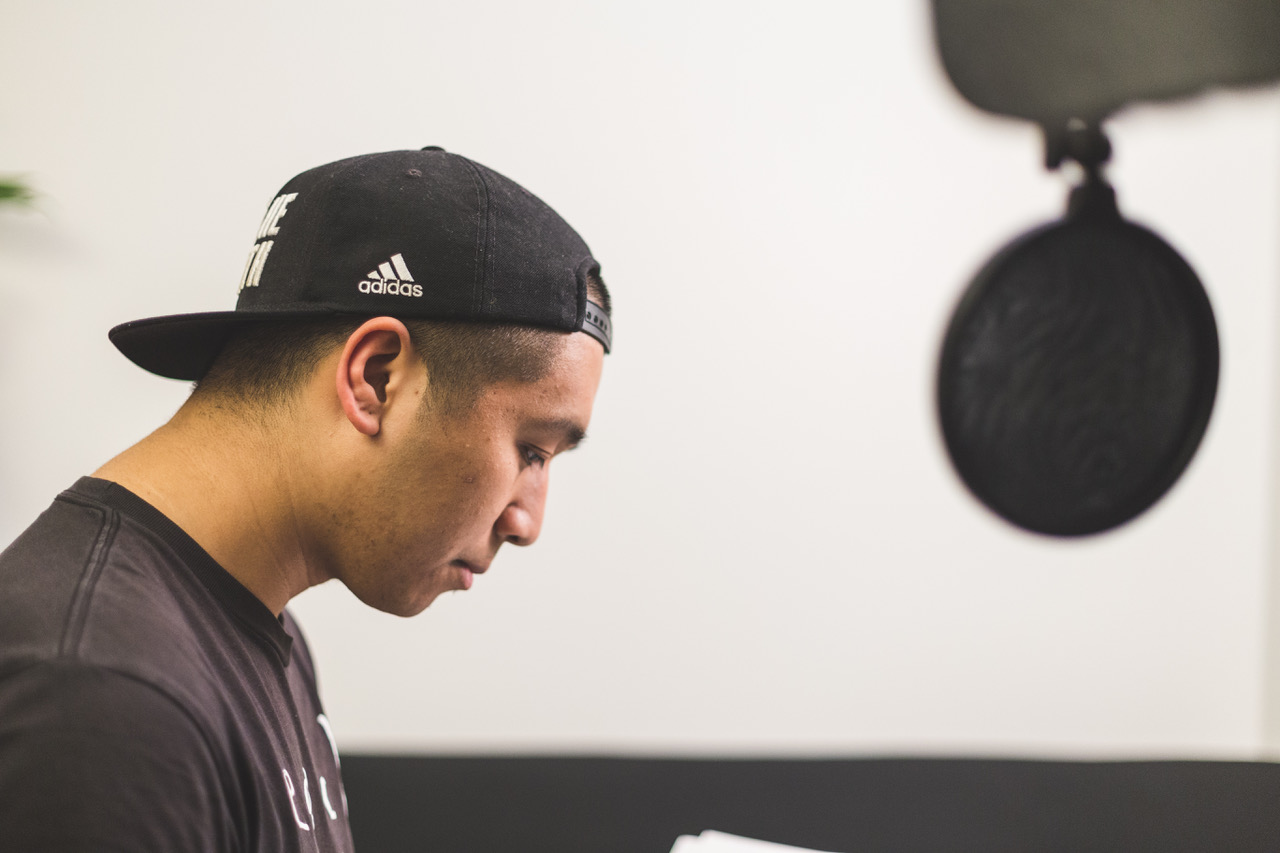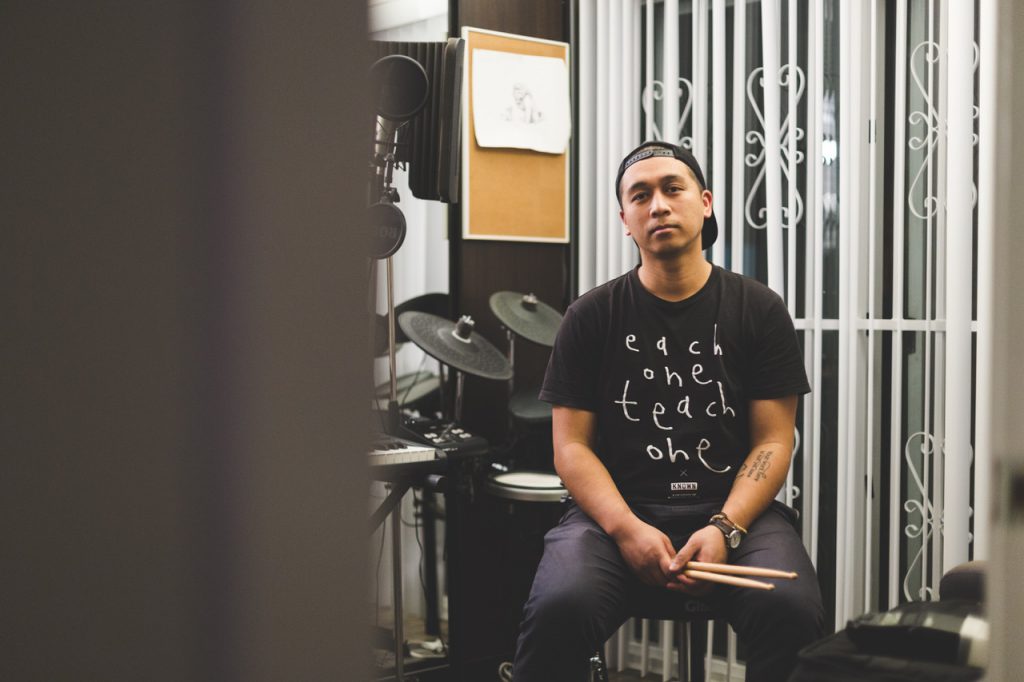Franci’s Story
BEFORE MENTAL HEALTH became an important part of his life, Francis was an up-and-coming artist who was already making a name for himself in Vancouver’s slam poetry scene. At 23, he’d won awards, was constantly asked to perform at events, and had even been named in the “24 under 24” list put together by the 24 Hours newspaper.
Those days, when he wasn’t writing or performing, Francis enjoyed playing basketball, making music, and hanging out with his family and friends. People described him as soft-spoken. Friendly.
For all intents and purposes, he was healthy and living out his life.
But in January of 2015, something inside Francis started to change. From one day to the next, his behaviour became erratic: he started making poor choices, became mean and began breaking ties with his friends.
In the process, he’s discovered that music gives him a healthy way to connect with other people, process his feelings and heal old wounds—all while allowing him to bring more visibility to mental health.
“It started with small things, like not being able to sleep at all and speaking really fast and in confusing sentences, but then it grew to something very different,” he remembers. “I began to have thoughts that didn’t really make sense and that I couldn’t separate from reality and became a very different person in ways that were really jarring for people.”
He didn’t know it at the time, but what Francis was experiencing was the onset of a manic episode that would last four months, and that would peak on April 27, 2015, when a poor decision landed him first in police custody and then at the UBC Psychiatry clinic, where he was diagnosed with bipolar disorder and spent a month in treatment.
“Coming out of the clinic was tough, because it was like coming back to the real world, and of course there were consequences for stuff that I had done or not done in the past few months,” he says. “For the most part what followed was a year of deep depression, in which all I would do was wake up, take my meds, eat, and go to sleep.”

New beginnings
Although he got psychiatric help throughout that year, Francis can pinpoint the exact day that his actual recovery began. It was April 27, 2016—exactly one year after he had first gone to the hospital to treat his bipolar disorder.
“When I noticed what day it was I took a good look at myself in the mirror and imagined what my life would be like if I stayed on the same path for another year,” he remembers. “That’s when I knew that I needed to take control.”
Francis decided that it was time to get out of his depressive slump, and get his life back on track. Intuitively, he knew that his recovery would be most effective if he began with small steps, so he set his eyes on a single goal: to lose weight in order to curb the cycle of self-loathing he had fallen into.
“It started with small things, like not being able to sleep at all and speaking really fast and in confusing sentences, but then it grew to something very different. I began to have thoughts that didn’t really make sense and that I couldn’t separate from reality and became a very different person in ways that were really jarring for people.”
“During my depression I had gained nearly 100 pounds. I couldn’t fit into my clothes anymore and didn’t feel like myself, which made me more angry at myself,” he says.
For the first time in over a year, Francis felt like he had purpose. That very day, he went for a walk around the block, and continued doing so every day for the next week. Eventually he felt like he could push himself a bit further, and began to jog instead of walk. After a couple of weeks, he noticed that he was feeling much better, so he aimed for bigger things, like going to the gym or walking up the Grouse Grind, a local hike.
It was a slow process, but by the end of that summer, Francis was jogging up the Grouse Grind a few times a week.
By then, he had lost most of the weight he had gained and was feeling good about himself again. He had broken from the shackles of his depression, and with this newfound sense of confidence, he decided he was ready to take another step.
“It was the end of September, and I was finally feeling comfortable in my own skin again, so I started to work again, and committed myself to an exciting new mission: to tell my story through music.”

The Power of Music
Every morning for the past year and a half, Francis has sat down to write before heading out to work. Some days he’ll only write a word. Other days it’s a thought or a feeling. Sometimes it’s a full journal entry.
“Writing helps me understand myself,” he says. “I feel at home when I’m writing. No matter what I write, it makes me happy.”
Over the past year, this regimented writing schedule has left him with several notebooks full of work, which he then transforms into emotional and thought-provoking rap songs, some of which explore his relationship with mental health.
“What I end up sharing and producing for the world is stuff that usually starts in some form of journal or diary or napkin, which are the most unfiltered, pure thoughts I have,” he says. “It’s really exciting, because as opposed to before, I feel like I have something important to say with my music, and what’s best is that the art that’s made from that very charged place can be really beautiful.”
If you’ve been paying attention to the Vancouver underground rap scene in the past year, you’ll surely have heard of him. He’s performed in venues around town (alone, in duo with Roya Bennet, and as part of a group called The Lions We Are), and has released two mixtapes.
In the process, he’s discovered that music gives him a healthy way to connect with other people, process his feelings and heal old wounds—all while allowing him to bring more visibility to mental health.
“Music and art have this incredible healing power when it comes to mental health that not only helps the person who is making it, but also whoever is consuming it,” Francis says.
Something inside Francis started to change. From one day to the next, his behaviour became erratic: he started making poor choices, became mean and began breaking ties with his friends.
A leading voice
Francis’ contributions to mental health over the last year and a half have not gone unnoticed.
In October of 2017, a little over a year after he started writing music again, the Centre for Addiction and Mental Health distinguished him as one of the 150 leading Canadians in Mental Health, highlighting his journey and the work he’s done to break down the stigma that still surrounds mental health disorders like bipolar disorder.
The award was totally unexpected, especially given the fact that only a year and a half before, Francis was in the middle of a long depressive episode.
“I get chills every time I think of everything that has happened in this short time. It almost doesn’t feel real. On April 27, 2016, when I decided to start this recovery process for real, all I knew to do was to take that first step and go for a walk around the block, and look at how far it’s gotten me.”
While a lot has changed since then, Francis continues to go to counselling and take medication to control his bipolar disorder, and is convinced that that only way to achieve his goals is by taking small, deliberate steps.
“You just have to start walking; to take that first step and start moving forward,” he says. “Sooner or later, after a hundred steps, you’re going to be a hundred steps further than where you were.”
This story is part of a series aimed at sharing the experiences of young people across BC. As part of Foundry’s goal to work alongside young people, create connections and promote mental health and wellness, we are creating a platform for young people’s stories to be heard.
Article by Peter Mothe. Photography by Connor McCracken.
If you are in crisis, please call 1-800-784-2433.
Find out more about Foundry.